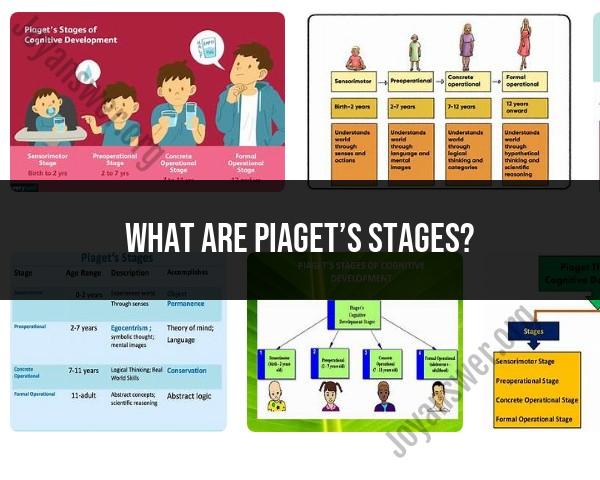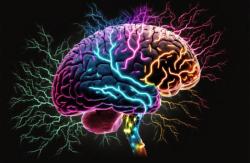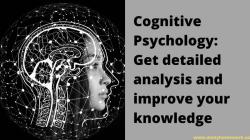What are Piaget’s stages?
Jean Piaget, a Swiss developmental psychologist, proposed a theory of cognitive development that outlines distinct stages through which individuals pass as they grow and mature. Piaget's theory is widely known as the "Piagetian stages." These stages describe the progression of cognitive abilities and how individuals understand the world around them. Piaget identified four main stages:
Sensorimotor Stage (Birth to 2 Years):
- During this stage, infants and toddlers learn about the world through their sensory perceptions and motor activities. Key developments include the understanding of object permanence (the concept that objects continue to exist even when they are not seen) and the development of basic motor skills.
Preoperational Stage (2 to 7 Years):
- In this stage, children begin to use symbols and language to represent objects and ideas. However, their thinking is characterized by egocentrism, where they have difficulty understanding perspectives other than their own. They also lack the concept of conservation, meaning they may not grasp that the quantity of a substance remains the same even when its appearance changes.
Concrete Operational Stage (7 to 11 Years):
- During this stage, children become more logical and can perform operations on concrete objects and events. They begin to understand the conservation of mass, volume, and number. However, abstract and hypothetical thinking is still challenging for them.
Formal Operational Stage (11 Years and Older):
- In the formal operational stage, individuals develop the ability for abstract and hypothetical reasoning. They can think about possibilities, hypotheses, and abstract concepts. This stage is not limited to childhood; it extends into adolescence and adulthood. Individuals at this stage can think about concepts such as justice, love, and values in a more abstract and idealistic way.
It's important to note that not all individuals progress through these stages at the same rate, and some might not reach the formal operational stage. Piaget's theory has been influential, but it has also faced criticism and refinement over the years. Some researchers have suggested that development is more continuous than Piaget proposed, and cultural and social factors may influence cognitive development. Despite these critiques, Piaget's stages continue to provide a valuable framework for understanding cognitive development in children.
What are the distinct stages described in Piaget's theory of cognitive development?
Jean Piaget, a renowned Swiss psychologist, developed a theory of cognitive development that describes four distinct stages through which children pass as they learn and grow. These stages are:
1. Sensorimotor Stage (Birth to 2 Years)
- In this stage, infants and toddlers learn about the world through their senses and motor actions. They explore objects by grasping, sucking, mouthing, and manipulating them.
- Object permanence, the understanding that objects continue to exist even when they are out of sight, develops towards the end of this stage.
- Key characteristics:
- Reflexes dominate behavior.
- Development of object permanence.
- Understanding of cause and effect.
- Egocentric thinking (belief that everyone sees the world the same way they do).
2. Preoperational Stage (2 to 7 Years)
- During this stage, children develop the ability to use symbols and representational thinking. They can use language, pretend play, and mental imagery to represent objects and ideas.
- However, preoperational children still struggle with logical reasoning, conservation (understanding that the quantity of something remains the same even when its appearance changes), and reversibility (understanding that actions can be undone).
- Key characteristics:
- Symbolic representation and language development.
- Animism (belief that inanimate objects have life).
- Egocentric thinking persists.
- Difficulty with conservation and reversibility.
3. Concrete Operational Stage (7 to 11 Years)
- In this stage, children develop the ability to think logically and reason about concrete objects and events. They can perform operations, such as addition, subtraction, and classification.
- Conservation and reversibility are mastered during this stage.
- Key characteristics:
- Logical thinking and reasoning.
- Conservation of number, length, mass, and volume.
- Reversibility of actions.
- Decentration (ability to consider multiple perspectives).
4. Formal Operational Stage (11 Years and Beyond)
- In this stage, adolescents develop the ability to think abstractly and hypothetically. They can reason about hypothetical situations and consider multiple possibilities.
- Formal operational thinkers can also engage in deductive reasoning, forming conclusions based on general principles.
- Key characteristics:
- Abstract reasoning and hypothetical thinking.
- Deductive reasoning.
- Ability to solve complex problems.
- Development of a personal identity and worldview.
It's important to note that these stages are not rigid and there is individual variation in the pace of development. Some children may progress through the stages more quickly or slowly than others. Additionally, these stages are not completely distinct from each other. Skills and concepts learned in earlier stages build upon one another and continue to develop throughout life.
Here's a table summarizing the key characteristics of each stage:
| Stage | Age Range | Key Characteristics |
|---|---|---|
| Sensorimotor | Birth to 2 years | Reflexes, object permanence, cause and effect, egocentrism |
| Preoperational | 2 to 7 years | Symbolic representation, language, animism, egocentrism, difficulty with conservation and reversibility |
| Concrete Operational | 7 to 11 years | Logical thinking, conservation, reversibility, decentration |
| Formal Operational | 11 years and beyond | Abstract reasoning, hypothetical thinking, deductive reasoning, complex problem solving, personal identity and worldview |
Understanding Piaget's theory of cognitive development can help educators, parents, and caregivers better understand how children learn and grow. By providing age-appropriate experiences and activities, adults can support children's cognitive development and help them reach their full potential.












